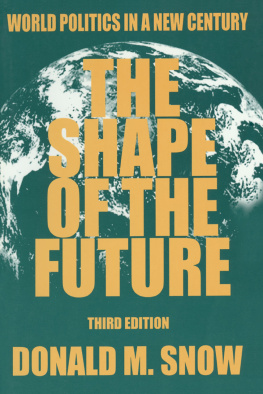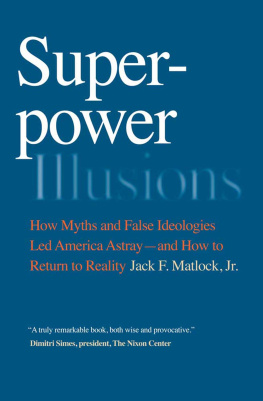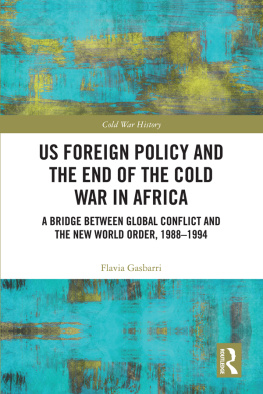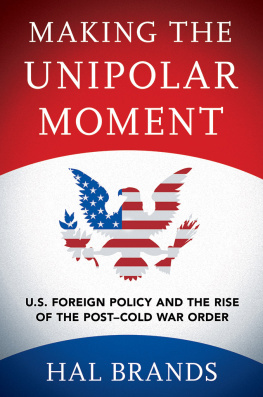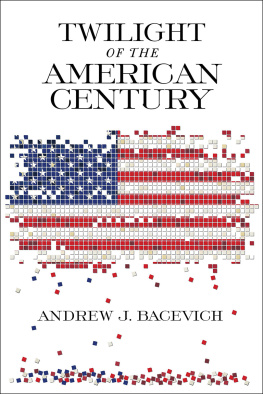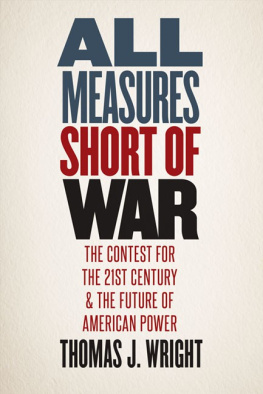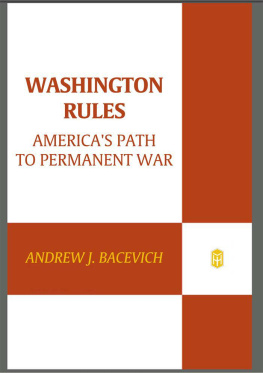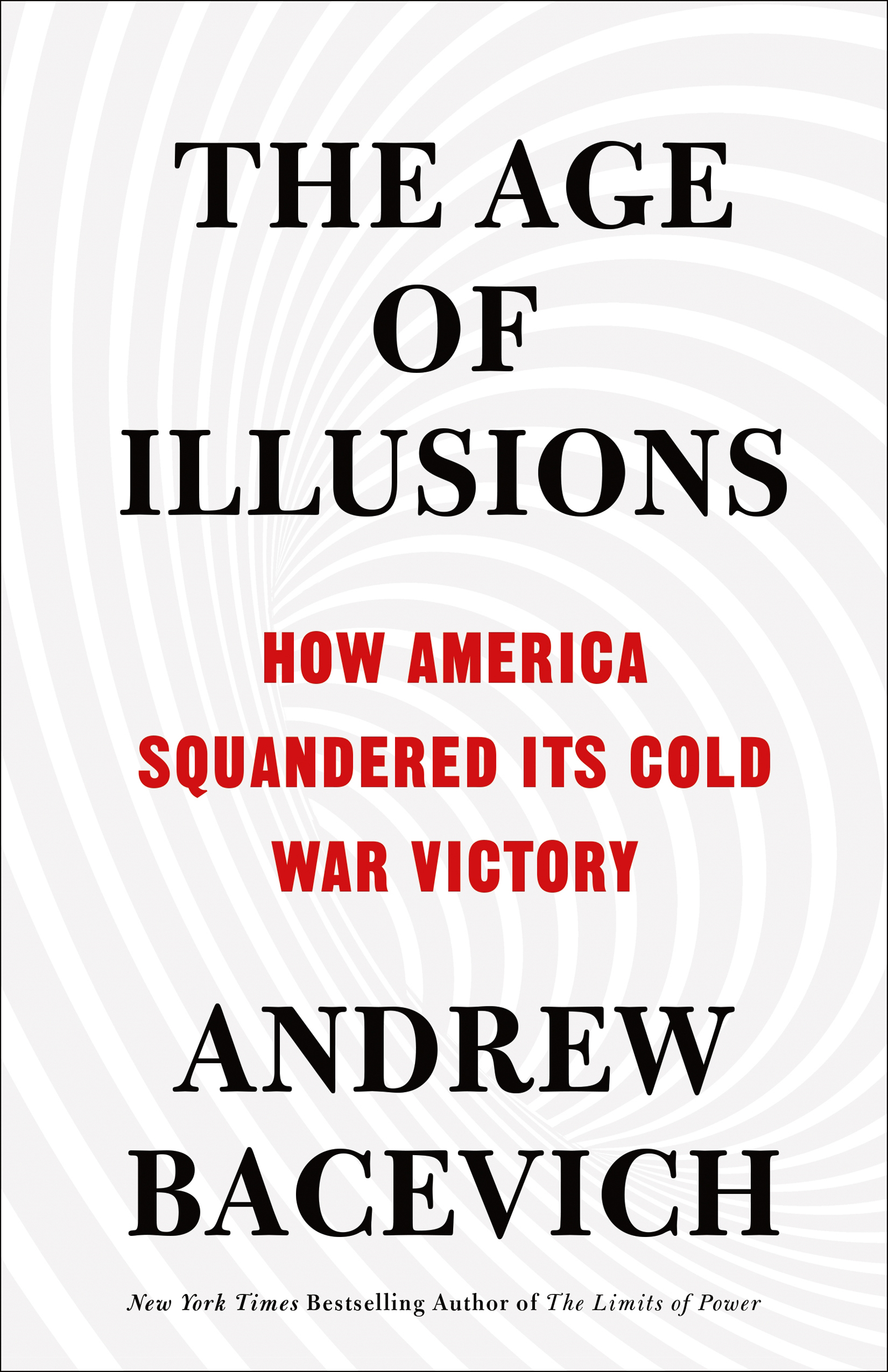The author and publisher have provided this e-book to you for your personal use only. You may not make this e-book publicly available in any way. Copyright infringement is against the law. If you believe the copy of this e-book you are reading infringes on the authors copyright, please notify the publisher at: us.macmillanusa.com/piracy.
To Eliot A. Cohen,
with admiration, affection, and enduring gratitude
In America, though, life seems to move faster than anywhere else on the globe and each generation is promised more than it will get: which creates, in each generation, a furious bewildered rage, the rage of people who cannot find solid ground beneath their feet.
Without the Cold War, whats the point of being an American?
Harry Rabbit Angstrom, novelist John Updikes late-twentieth-century Everyman, posed that question just as the long twilight struggle was winding down. More than a quarter of a century later, Rabbits plaintive query still awaits a definitive answer. Indeed, the passage of time has only sown confusion about whether there is a point to being an American.
Even as the Cold War was ending, Updikes surrogate was not alone in feeling at a loss. By the 1980s, the Cold War had become more than a mere situation or circumstance. It was a state of mind. As had Rabbit, most Americans had come to take its existence for granted. Like the polar ice cap or baseballs status as the national pastime, it had acquired an appearance of permanence. So its passing caught Rabbits fellow citizens unawares. Those charged with managing the Cold War were, if anything, even more surprised. The enterprise to which they had devoted their professional lives had suddenly vanished. Here was a contingency that the sprawling U.S. national security apparatus, itself a product of the anti-Communist crusade, had failed to anticipate.
At one level, of course, the surprise could not have been more gratifying. In the epic competition pitting West against East, the God-fearing against the godless, and democracy against totalitarianism, our side had won. All-out nuclear war had been averted. The cause of freedom, which Americans felt certain they themselves embodied, had prevailed. Victory was decisive, sweeping, and unequivocal.
In another sense, however, the passing of the Cold War could not have been more disorienting. In 1987, a senior adviser to Soviet leader Mikhail Gorbachev had warned, We are going to do a terrible thing to youwe are going to deprive you of an enemy. As the Soviet Union passed out of existence, Americans were left not just without that enemy but without even a framework for understanding the world and their place in it. However imperfectly, the Cold War had for several decades offered a semblance of order and coherence. The collapse of Communism shattered that framework. Where there had been purposefulness and predictability, now there was neither.
Winning the Cold War brought Americans face-to-face with a predicament comparable to that confronting the lucky fellow who wins the Mega Millions lottery: hidden within an apparent windfall is the potential for monumental disaster. Putting that windfall to good use while avoiding the pitfalls inherent in suddenly acquired riches calls for prudence and self-awarenessnot easily demonstrated when the big house, luxury car, and vacation condo youve always wanted are yours for the asking.
Similarly, the end of the Cold War might have given Americans pause, especially since the issues at hand were of considerably greater significance than homes, cars, and condos. At least in theory, the moment might have invited reflection on some first-order questions: What is the meaning of freedom? What does freedom allow? What obligations does it impose? Whom or what does it exclude?
Of course, Americans had been wrestling with such questions since well before 1776, their answers evolving over time. During the several decades of the Cold War, however, the exigencies of the EastWest rivalry had offered a reason to throttle down impulses to explore freedoms furthermost boundaries. Except on the fringes of American politics, most citizens accepted the word from Washington that their way of life was under grave threat. In the pecking order of national priorities, addressing that threatdefending freedom rather than enlarging ittended to take precedence over other considerations.
This is not to suggest that Cold War Americans were a compliant lot. They were not. From the 1950s, misleadingly enshrined as a decade of conformity, through the Reagan-dominated 1980s, domestic crises and controversies were constants. Among the issues energizing or enraging Americans were civil liberties, the nuclear arms race, mismanaged wars of dubious provenance, challenges to artistic tradition, left-wing and right-wing radicalism, crass materialism that coexisted with widespread poverty, and a host of simmering issues connected to race, sex, and gender. Yet through it all, a common outlook, centered on resistance to the Red threat, endured. For most citizens most of the time, the Cold War itself sufficed to explain the point of being an American.
The collapse of the Soviet Empire between 1989 and 1991 robbed that outlook of its last vestiges of authority. Rarely, if ever, had the transition from one historical period to another occurred quite so abruptly, with such a precise set of demarcations, and with such profound implications. As if in an instant, the discipline that the Cold War had imposed vanished. The absurdity of defining reality as an either/or choiceRed or dead, slave or free, good vs. evilnow became blazingly apparent. The impact on American ambitions and expectations was akin to removing the governor from an internal combustion engine. Suddenly the throttle opened up. The future appeared uniquely promising, offering Americans a seemingly endless array of choices, while confronting them with few evident constraints. Everything seemed possible.
Confident that an era of unprecedented U.S. economic, military, and cultural ascendancy now beckoned, members of an intoxicated elite threw caution to the winds. They devisedand promulgateda new consensus consisting of four elements.
The first of these was globalization or, more precisely, globalized neoliberalism. Stripped to its essence, globalization was all about wealth creation: Unconstrained corporate capitalism operating on a planetary scale in a world open to the movement of goods, capital, ideas, and people would create wealth on a hitherto unimagined scale.
The second element was global leadership, a euphemism for hegemony or, more simply still, for empire. At its core, global leadership was all about order: Unchallengeable military might would enable the United States to manage and police a postcolonial yet implicitly imperial order favorable to American interests and values. Through the exercise of global leadership, the United States would enforce globalization. Order and abundance would go hand in hand.
The third element of the consensus was freedom, an ancient word now drastically revised. The new conception of freedom emphasized autonomy, with traditional moral prohibitions declared obsolete and the removal of constraints maximizing choice. Order and abundance together would underwrite freedom, relieving Americans of existential concerns about safety and survival to which those less privileged were still obliged to attend.


